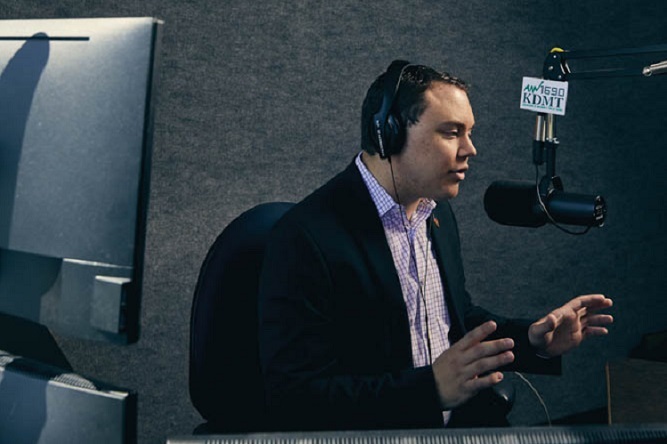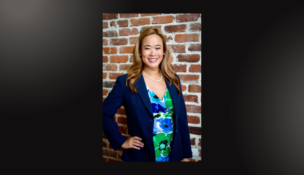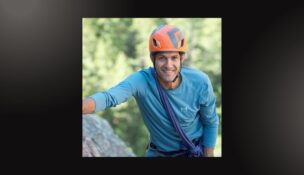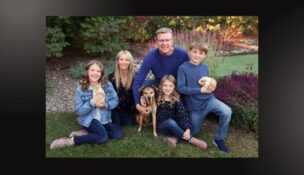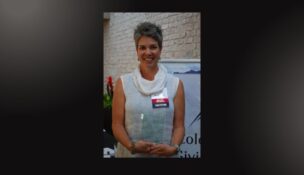Breakfast with Jimmy Sengenberger: Briefing on Business
Good company: Morning drive-time host gets commuters up to speed on money, politics and the economy
Mike Taylor //July 2, 2019//


Breakfast with Jimmy Sengenberger: Briefing on Business
Good company: Morning drive-time host gets commuters up to speed on money, politics and the economy
Mike Taylor //July 2, 2019//
PHOTO BY JEFF NELSON
Jimmy Sengenberger, 28
Radio host, speaker, writer, nonprofit president
Other interests: Blues and classic rock, occasionally filling in with various bands on the harmonica.
Since January 2017, Jimmy Sengenberger has been giving Front Range commuters their first glimpse of the financial markets, the economy, politics and news — and opinions on all those topics — as the host of “Business for Breakfast with Jimmy Sengenberger.” The show airs weekdays from 6 a.m. to 9 a.m. on AM 1690 KDMT and includes guests such as Dominic Chu, senior markets correspondent for CNBC; Crista Huff, lead analyst at Cabot Undervalued Stocks Advisor; nationally syndicated columnist Ruben Navarrette; and many others.
Sengenberger also hosts the “Jimmy Sengenberger Show,” a conservative-leaning talk show now in its seventh year that airs Saturdays from 5 p.m. to 8 p.m. on Denver’s News/Talk 710 KNUS. And he finds time to serve as president and CEO of Liberty Day Institute, a nonpartisan, nonprofit dedicated to civic education programs in K-12 schools. An outgrowth of that organization is the Millennial Policy Center think tank program, which he founded three years ago.
Sengenberger was born in Albany, New York, and spent his early years in New Jersey before moving with his family to Denver when he was 10. He knew from an early age he wanted to be a radio talk-show host. Beginning his freshman year at Regis University, he hosted a two-hour weekly show on Thursday nights that aired campus-wide. Sengenberger graduated in three years with a major in politics and minor in economics. Days after graduation, he officially launched his professional radio career at age 20, filling in as a host on a Sunday night show for KNUS.
ColoradoBiz: What aspects of your upbringing and education prepared you to excel as a talk-show host?
Jimmy Sengenberger: My grandfather was my inspiration for radio. The summer when I was 12, my grandpa and I were going golfing. We were talking religion earlier, and then on the way back to his house, Rush (Limbaugh) was on. I was just curious. It was the voice; it was the passion. I got back to Colorado, and I had portable CD player that also had a radio on it. I was listening every day, the rest of the summer.
CB: Your authoritative radio presence belies your youth. Where does that come from?
JS: I’ve always been a self-starter. I was about 13 when a family friend started taking me to a Republican breakfast group, and it wasn’t long before I started speaking up at those group meetings. Most of the people were four or five times my age. When I was growing up, I always felt more comfortable with adults than with my own age group. When I was a teenager in high school, I would record mock radio shows. Sometimes, I would have guests. I’d have my siblings call in, or I’d invite a friend to come over and debate me. I’d record it on a Walkman. Mostly it was just me monologuing.
CB: Was there an audience for these recordings, or was this strictly practice?
JS: When my grandfather would visit, I would want to play for him. And I remember a family trip; we used to drive cross-country to get to Albany every year. One year during the trip, I made my parents listen to one of the recordings. I remember that because my dad said, “You’re saying ‘um and uh’ too much.” I was like, 14.
CB: How did “Business for Breakfast with Jimmy Sengenberger” come about?
JS: I’d been hosting my own show for Salem (Radio Network) since September 2013, “The Jimmy Sengenberger Show,” on 710 KNUS, Saturday evenings. And I’d always expressed an interest to the station management in doing more. After Salem acquired the station, they started shaping what KDMT “Denver’s Money Talk” was going to be. The thought was posed to me, ‘Would you be interested in doing a show on business and economic issues?’ My minor was in economics; I’ve always been curious about those issues and paid close attention to them. Interviews are my strong suit. So on January 30, 2017, we launched ‘Business for Breakfast.’
CB: What’s the most challenging aspect of hosting a three-hour radio show?
JS: The most challenging thing for me is mornings, because I’m not a morning person. When the microphone goes on and the adrenaline kicks in, I’m ready to go, and I’m having fun, and you can’t tell that I’m by no means a morning person. But on the weekends, if I can sleep in until 11, I will sleep until 11.
CB: What qualities make “Business for Breakfast” stand out?
JS: I come at it from a conservative political and policy perspective, but that doesn’t mean it’s conservative talk. The point is to have conversation about issues of the day, with an opinion. And so I like when I’m able to have people like Attorney General Phil Weiser or others on the program who disagree with me and are willing to engage in a good conversation.
We run the gamut on issues of the day. We’ll talk markets and investing, economics, business issues, marketing, branding. We’ll talk politics; the intersection of all those things. It’s not a one-trick pony on ‘Business for Breakfast.’ We’re always looking for people to come on who can offer something unique to our listeners.
CB: What do you look for as you line up guests?
JS: I want guests who will engage in a great conversation with me, more than just peppering them with an interrogatory-type interview. But also I want to make sure that it’s informative to the listener, because the program is not simply about one thing or another. We want to inform you, get you ready for the day, but also entertain you. So I look for guests who do that. I build relationships with the guests over time. It’s a matter of following up, bringing them back, making sure they feel like the occasion is going well, asking them what do you want to talk about today, that kind of thing. So much of interviewing for me, for guests who come back, is relationship-building. If I have a guest on, I want to make sure it’s someone I’m interested in talking to, because if I’m not interested, then chances are my listeners will be able to tell and also be less interested in the guest. So how you conduct an interview is in and of itself a relational experience, especially if you want to have them back.
CB: What do you see the future holding for Jimmy Sengenberger?
JS: It’s a question I’m working on and trying to figure out the trajectory of. My ultimate goal is to put Rush Limbaugh in his place at No. 2. That is to say, I would like to be a nationally syndicated radio talk show host. I especially love economic issues and that kind of stuff, which is why ‘Business for Breakfast’ is a very strong fit for me. I want to be an influencer. I want to help influence the discussion, guide the discussion in ways that will actually better our country, better our communities, better people’s everyday lives. Because that, in the end, is what economics is about, that’s what politics is about, that’s what business is about.






